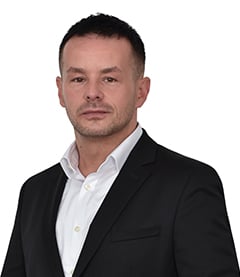
The European Defence Fund (EDF) offers companies and institutions in the defence industry promising opportunities. Thanks to large financial grants, established market participants can develop new areas of business and make a decisive contribution to a secure Europe. At the same time start-ups and small and medium-sized enterprises (SMEs) get unique opportunities to establish themselves with innovative technologies. And those who are already successfully offering products and services in the civil market absolutely must check whether their services can be meaningfully put to use in the civil-military arena. In this article you will find out what companies and projects are eligible and what conditions need to be fulfilled.
The European Defence Fund – what’s behind it?
With the introduction of the EDF in 2016 the European Commission already set a clear signal that European defence should be considered a community task. The European Union is pursuing the goal of intensifying collaboration between the Member States, reducing costs through centralisation and increasing the competitiveness of the European defence market. In the continuation of the initial project since 2021, a total of €8 billion has been available. Of this, €2.7 billion is earmarked for defence research and €5.3 billion for the development of military capabilities. In 2025, €1.1 billion will be awarded to suitable applicants. For 2026 and 2027, a total of around €2.6 billion will remain of the fund.
Why the EDF is relevant to European companies
To ensure the security of Europe as a business location, civil and public institutions must work together closely. The EU has set clear objectives with the EDF and at the same time offers practical assistance with implementing them. The political will is clearly defined and bolstered with financial support. The future of the defence market is coming about. Now companies that develop new technologies or who already command them are particularly sought after.
Eligible companies and conditions – who can profit from the EDF?
If your company is resident in the EU or Norway and is not controlled by an enterprise outside these countries, you could be eligible for support from the EDF. It should be noted that this also applies to all the resources and subcontractors involved in the project.
Under certain conditions, deviating from these rules may be allowed, however. But in some cases this is linked to additional conditions on making applications or involves challenges to later collaboration that need to be thought about, such as how to deal with classified information.
The needs of SMEs and midcap companies are taken into account separately. This can be seen in the higher share of costs absorbed by the funding.
But those who act by themselves won’t have any chance of getting any subsidies from the fund. To strengthen cooperation and networking within Europe only projects are supported that are proposed by a consortium of at least three enterprises that are independent of each other from three different countries within the scope.
What topics does the EDF support?
Alongside the traditional military domains (ground, air, naval), current areas are also to be developed and produced in particular, such as the reliable and secure exchange of information, cyber and disruptive technologies. Each year the European Commission publishes the eligible projects in its “EDF Work Programme” document and locates them within the following 16 areas:
- Defence medical response, chemical, biological, radiological and nuclear (CBRN), biotech and human factors
- Information superiority
- Advanced passive and active sensors
- Cyber
- Space
- Digital transformation
- Energy resilience and environmental transition
- Materials and components
- Air combat
- Air and missile defence
- Ground combat
- Force protection and mobility
- Naval combat
- Underwater warfare
- Simulation and training
- Disruptive technologies
Applicants may also submit their own ideas that are outside the given topics, but which can be allocated to one of the relevant areas.
In 2025 applications are still open until 16 October via the EU Funding & Tenders Portal. The German national focal point already ended support for new draft projects last June. Those who are not able to keep this year’s deadline can find out which topics will probably be supported in the coming years in the document “Indicative Multiannual Perspective 2025-2027”. Practically speaking, the new calls for proposals are expected to be announced after the end of 2025.
In the past, projects supported included those in which European capacities to produce munition and the practical re-use of used protection equipment were improved. Furthermore, the development of prototypes for micro controllers using post-quantum cryptography is being supported, which will ensure in future that communication between technical systems remains secure. The possibilities arising from the progress of renewable sources of energy for the independent energy supply of military camps are also being analysed. This last example demonstrates very well that civilian enterprises that until now did not have any connection to military installations are sought after on the market.
Challenges on participating – what companies should know
Different criteria and conditions apply depending on the level of support being applied for, the size of the company and the type of project. Applicants can find the necessary documents and forms on the EU Funding & Tenders Portal in the appendices to the tenders and submit them directly online. Requests to collaborate from interested parties without a partner can also be found on the tenders pages.
In awarding tenders, the decision-makers take various aspects into account. Among other things, the project should be innovative. It is also checked whether the consortium is credibly able to work on the project for the entire duration of the funding and achieve the desired results. As part of their application, the applicants are required to provide the necessary documents, such as annual revenue statements, annual audit reports and a presentation of the key persons involved. We’ll be glad to assist you with this.
A group of six independent experts then evaluates the draft projects based on six (for research activities) or eight (for development activities) criteria.
- Estimation of the quality
- and innovation of the proposed technology
- Potential on the market
- Independence from sources outside Europe
- Extent of cooperation between involved countries and SME/midcap participation
- Feasibility of the financed activity (as previously described)
- Efficiency related to the life-cycle of the product (development only)
- State interest of more than one EU country in integrating the technology into the joint defence strategy (development only)
The share of the costs that can be covered by the EDF is based on the proposal. Not all actions are supported equally. The more mature the technology, the lower the share of support. This means that the development of prototypes is only eligible up to 20%, while certificates of suitability and certifications are financed at 70% and research activities at 100%. Projects related to the EU’s PESCO defence initiative and the participation of SMEs/midcaps can increase the eligible amount of your activities. Cofinancing by European states or Norway is also possible.
Strategic tips – how European companies can successfully make use of the EDF
In the EDF an application that has convincing contents and that complies with the rules is just as important as gathering specialist expertise in the consortium. So obtaining advice on funding can be very valuable to many companies. Particularly if you lack knowledge, for instance on how to comply with European protection of classified information or other compliance requirements, involving experienced advisers is recommended. It is even possible to include the costs for subcontractors in the grant. Since the projects are tendered Europe-wide, a lot of competition can be expected. It is therefore all the more important to present a high-quality project through focused cooperation.
Conclusion – the EDF as an opportunity for research, security and competitiveness
The EDF is an important instrument for the innovation, cooperation and independence of the European defence strategy. The European defence market will necessarily continue to grow in the coming years. For European companies, the EDF offers a chance to participate and position themselves on the market. Good preparation and strong partnerships are essential.
Grant Thornton Germany offers a wide variety of services that can support you with successfully implementing your projects in the defence market.
Do you need advice on EDF grants? Are you looking for support with the compliant processing of classified information? Or would you like to profit from our experience and that of our international Grant Thornton network in the complex field of security and defence in other ways?
Contact our expert Steffen Kunaht, head of defence and resilience.
The article was authored in cooperation with Birger Schumann (Consultant).

